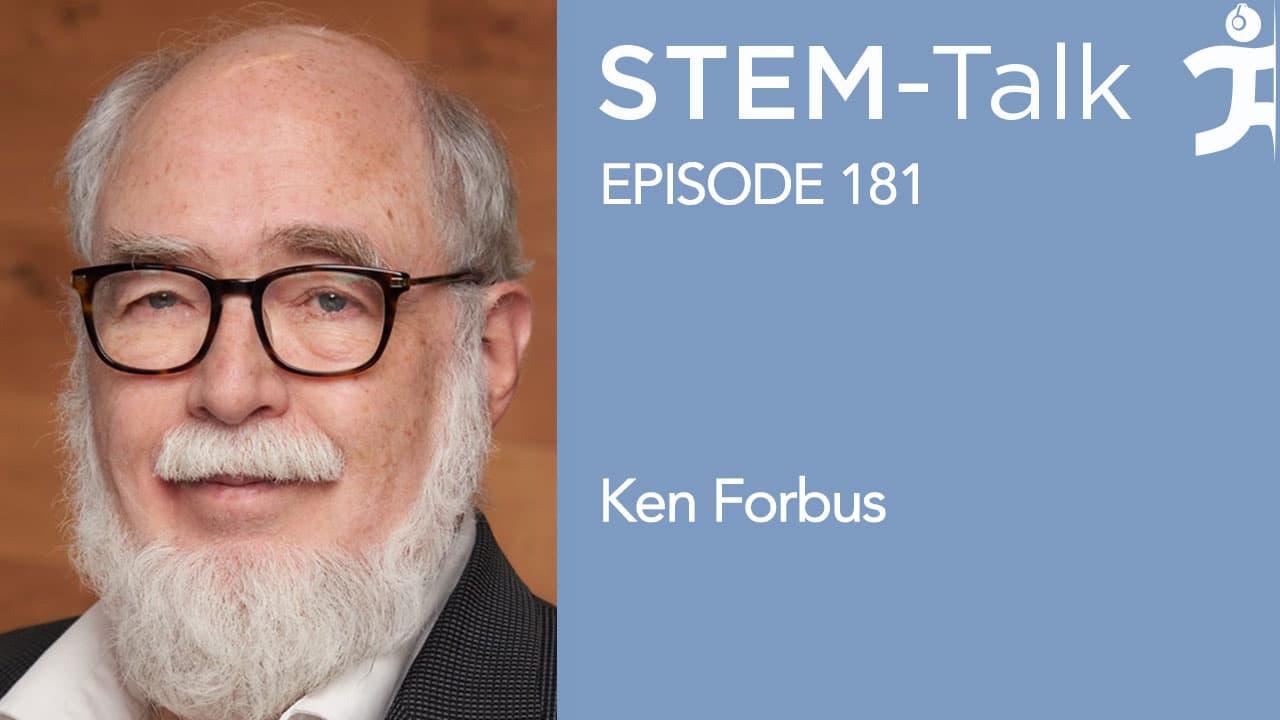STEM-Talk
Episode 181: Ken Forbus talks about AI and his development of the Structure Mapping Engine
// May 13, 2025

Our guest today is Dr. Ken Forbus, the Walter P. Murphy Professor of Computer Science and a Professor of Education at Northwestern University.
Joining Dr. Ken Ford to co-host today’s interview is Dr. James Allen, who was IHMC’s associate director until he retired a few years ago. James is a founding fellow of the American Association for Artificial Intelligence and a perfect fit for today’s discussion with Dr. Forbus, who, like James, is an AI pioneer. Back in 2022, James was named a fellow by the Association for Computational Linguistics, an organization that studies computational language processing, another field he helped pioneer.
Dr. Forbus also is a Fellow of the Association for the Advancement of Artificial Intelligence and was the inaugural winner of the Herbet A. Simon Prize for Advances in Cognitive Systems. He is well-known for his development of the Structure Mapping Engine. In artificial intelligence and cognitive science, the Structure Mapping Engine is a computer simulation of analogy and similarity comparisons that helped pave the way for computers to reason more like humans.
Show Notes:
[00:03:07] Ken opens the interview with Dr. Forbus by asking if it is true that he had an unusual hobby for a nerdy kid growing up. [00:04:18] James mentions that Dr. Forbus’ family moved often when he was younger and asks how that affected him. [00:05:18] Ken mentions that when Dr. Forbus was in high school, he filled his free time reading about psychology and cognition before eventually coming across some articles on AI. Ken asks Dr. Forbus to talk about this experience and what happened next. [00:07:49] James asks Dr. Forbus if he remembers the first computer he owned. [00:09:17] Ken asks Dr. Forbus if there was anything, other than its reputation, that led him to attend MIT. [00:10:09] James mentions that for the past few decades, Dr. Forbus has been working on developing “human like” AI systems. While much of AI research and development has been focused on meeting the standard of the Turing test, James asks Dr. Forbus why he is not a fan of the Turing test. [00:12:24] Ken mentions that Dr. Forbus received his Ph.D. from MIT in 1984, the same year that Apple released the first Macintosh, which was rolled out with a famous Super Bowl ad. This computer was the first successful mouse driven personal computer with a graphical interface. Ken asks Dr. Forbus what he remembers about that ad, and what his reaction to it was at the time. [00:13:22] James mentions that 1984 was also the year that Dr. Forbus made his first splash in the AI world with his paper on qualitative process theory. James goes on to explain that at the time, qualitative reasoning regarding quantities was a major problem for AI. In his paper, Dr. Forbus proposed qualitative process theory as a representational framework for common sense physical reasoning, arguing that understanding common sense physical reasoning first required understanding of processes and their effects and limits. James asks Dr. Forbus to give an overview of this paper and its significance. [00:18:10] Ken asks Dr. Forbus how it was that he ended up marrying one of his collaborators on the Structure Mapping Engine project, Dedre Gentner. [00:19:14] James explains that Dedre’s Structure Mapping Theory explains how people understand and reason about relationships between different situations, which is central to human cognition. James asks Dr. Forbus how Dedre’s theory was foundational for the Structure Mapping Engine (SME). [00:25:19] Ken mentions how SME has gone through a number of changes and improvements over the years, as documented in Dr. Forbus’ 2016 paper “Extending SME to handle large scale cognitive modeling.” Ken asks, as a cognitive model, what evidence Dr. Forbus has used to argue for the psychological and cognitive plausibility of SME. [00:30:00] Ken explains that many AI systems rely on deep learning, which is a subset of machine learning, using multi-layered artificial neural networks to automatically learn and extrapolate data. Ken goes on to say that Dr. Forbus has pointed out that both people and SME are able to learn successfully with far less data than deep learning requires. Ken asks Dr. Forbus to expand on this. [00:35:21] James mentions that Dr. Forbus has been working a lot over the past decade on companion cognitive architectures, which aim to reach human level AI, by creating software social organisms, which are systems that interact with people using natural modalities. Dr. Forbus elaborated on this in a 2016 paper titled “Software social organisms: Implications for measuring AI progress” where he argued that achieving human level AI is equivalent to learning how to create sufficiently smart software social organisms. James asks Dr. Forbus to briefly describe this concept. [00:44:18] James mentions that Dr. Forbus’ goal with this system is to create systems that can interact with people as apprentices or collaborators rather than just tools. In Dr. Forbus’ paper “Analogy and Qualitative Representations in the Companion Cognitive Architecture ,” he presents two hypotheses on how to create such systems. Starting with the first, James asks Dr. Forbus to elaborate on his hypothesis regarding analogical reasoning and learning, incorporating retrieval and generalization as well as SME capability for analogical matching. [00:48:38] Ken asks Dr. Forbus to elaborate on the second hypothesis, qualitative representations. [00:51:11] James asks if it is correct that Dr. Forbus’ key takeaway in this paper was that the models of structure mapping were particularly robust. [00:52:00] Ken pivots to discuss Dr. Forbus’ book “Qualitative Representations: How People Reason and Learn About the Continuous World” in which Dr. Forbus proposes that qualitative representations, which are symbolic representations that carve continuous phenomena into meaningful units, hold the key to one of the deepest mysteries of cognitive science and are central to human cognition. Ken asks Dr. Forbus to talk about his book and its key points. [00:57:32] James explains that Dr. Forbus followed up his book with a review in Science Direct, exploring how visual reasoning tasks involving comparison provide insights into how people make similarity and difference judgements. James goes on to mention that Dr. Forbus and his colleague Andrew Lovett summarized evidence that the same structure mapping comparison processes that seem to be used elsewhere in cognition can be used to model comparison in human visual reasoning tasks, and this relies on qualitative visual relationships computed using CogSketch, a model of high-level human vision. James asks Dr. Forbus to talk about these findings. [00:59:22] James mentions that Dr. Forbus and his colleagues published a paper about the importance of sketch worksheets in STEM classrooms. They argue that sketching can be a valuable tool for science, but it is currently underutilized. Dr. Forbus and his colleagues recommend sketch worksheets that use AI technology to give students immediate feedback and give instructors assistance in grading. James asks Dr. Forbus to explain what sketch worksheets are and how they can be helpful. [01:01:06] Ken asks Dr. Forbus to give some examples of homework that have been assigned with sketch worksheets. [01:02:34] Ken brings up another one of Dr. Forbus’ papers, which focused on the issues of adversarial attacks on ethical AI systems. The paper investigated moral axioms and the use of deontic logic in a norm learning framework. They found that adding axiomatic moral prohibitions and deontic inference rules to a norm learning model will make it less vulnerable to adversarial attacks. Ken asks Dr. Forbus to talk more about this. [01:07:09] James asks Dr. Forbus what his thoughts are on the idea that AI will soon begin to replace humans. [01:19:52] James explains that the impressive performance of deep learning systems, particularly LLM’s like ChatGPT has simultaneously made it harder for researchers to engage in building cognitively based systems. James asks Dr. Forbus for his thoughts on how we might lay the groundwork for continuing the important work in cognitively based systems. [01:22:54] Ken closes our interview by asking Dr. Forbus if he is thinking about retirement anytime soon.Links:






